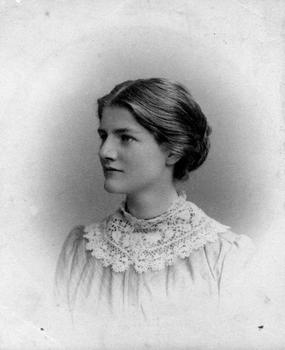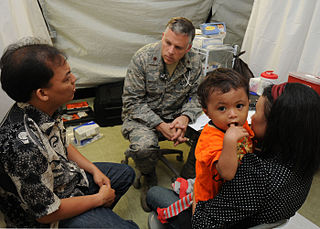
Physical therapy (PT), also known as physiotherapy, is one of the allied health professions. It is provided by physical therapists who promote, maintain, or restore health through physical examination, diagnosis, management, prognosis, patient education, physical intervention, rehabilitation, disease prevention, and health promotion. Physical therapists are known as physiotherapists in many countries.
Occupational therapists (OTs) are health care professionals specializing in occupational therapy and occupational science. OTs and occupational therapy assistants (OTAs) use scientific bases and a holistic perspective to promote a person's ability to fulfill their daily routines and roles. OTs have immense training in the physical, psychological, and social aspects of human functioning deriving from an education grounded in anatomical and physiological concepts, and psychological perspectives. They enable individuals across the lifespan by optimizing their abilities to perform activities that are meaningful to them ("occupations"). Human occupations include activities of daily living, work/vocation, play, education, leisure, rest and sleep, and social participation.

Occupational therapy (OT) is a healthcare profession. It involves the use of assessment and intervention to develop, recover, or maintain the meaningful activities, or occupations, of individuals, groups, or communities. The field of OT consists of health care practitioners trained and educated to improve mental and physical performance. Occupational therapists specialize in teaching, educating, and supporting participation in any activity that occupies an individual's time. It is an independent health profession sometimes categorized as an allied health profession and consists of occupational therapists (OTs) and occupational therapy assistants (OTAs). While OTs and OTAs have different roles, they both work with people who want to improve their mental and or physical health, disabilities, injuries, or impairments.

Mental health encompasses emotional, psychological, and social well-being, influencing cognition, perception, and behavior. It likewise determines how an individual handles stress, interpersonal relationships, and decision-making. Mental health includes subjective well-being, perceived self-efficacy, autonomy, competence, intergenerational dependence, and self-actualization of one's intellectual and emotional potential, among others.From the perspectives of positive psychology or holism, mental health may include an individual's ability to enjoy life and to create a balance between life activities and efforts to achieve psychological resilience. Cultural differences, subjective assessments, and competing professional theories all affect how one defines "mental health". Some early signs related to mental health difficulties are sleep irritation, lack of energy, lack of appetite and thinking of harming yourself or others.

Telerehabilitation (or e-rehabilitation is the delivery of rehabilitation services over telecommunication networks and the internet. Telerehabilitation allows patients to interact with providers remotely and can be used both to assess patients and to deliver therapy. Fields of medicine that utilize telerehabilitation include: physical therapy, occupational therapy, speech-language pathology, audiology, and psychology. Therapy sessions can be individual or community-based. Types of therapy available include motor training exercises, speech therapy, virtual reality, robotic therapy, goal setting, and group exercise.
A health professional, healthcare professional, or healthcare worker is a provider of health care treatment and advice based on formal training and experience. The field includes those who work as a nurse, physician, physician assistant, registered dietitian, veterinarian, veterinary technician, optometrist, pharmacist, pharmacy technician, medical assistant, physical therapist, occupational therapist, dentist, midwife, psychologist, or who perform services in allied health professions. Experts in public health and community health are also health professionals.
Haworth Press was a publisher of scholarly, academic and trade books, and approximately 200 peer-reviewed academic journals. It was founded in 1978 by the publishing industry executives Bill Cohen and Patrick Mcloughlin. The name was taken from the township of Haworth in England, the home of the Brontë sisters. Many of the Haworth publications cover very specialized material, ranging from mental health, occupational therapy, psychology, psychiatry, addiction studies, social work, interdisciplinary social sciences, library & information science, LGBT studies, agriculture, pharmaceutical science, health care, medicine, and other fields.

Elizabeth Casson was a British medical doctor and an occupational therapy pioneer. Initially training as a secretary, Casson began studying medicine at the University of Bristol when she was 32. She received her medical degree in 1926, becoming the first woman to receive one from the University of Bristol. She also attained the Gaskell prize from the Royal Medico-Psychological Association and a diploma in psychological medicine from the University of London.
The American Journal of Occupational Therapy is a bimonthly peer-reviewed medical journal that is published by the American Occupational Therapy Association. It covers research practice and health care issues in the field of occupational therapy.

The Boston University College of Health and Rehabilitation Sciences: Sargent College (SAR) is a unit of Boston University. The College offers both undergraduate and graduate degree programs to prepare students for both research and clinical careers in health care and the rehabilitation sciences.
This article discusses occupational therapy (OT) in the United Kingdom.

Physical & Occupational Therapy in Pediatrics is a medical journal that provides information to all therapists involved in developmental and physical rehabilitation of infants, children and youth. Designed for PT and OT pediatric professionals in hospitals, rehabilitation centers, schools, and health and human services agencies, the journal provides clinical research and practical applications. Current clinical advances and research findings are important for all therapists, and each issue of this journal brings therapists the latest discoveries in therapy as related to their work with children. With an emphasis on implications and applications for therapy practice, the journal includes case reports, and reviews/critiques of new measures.

The management of domestic violence deals with the treatment of victims of domestic violence and preventing repetitions of such violence. The response to domestic violence in Western countries is typically a combined effort between law enforcement, social services, and health care. The role of each has evolved as domestic violence has been brought more into public view.

Asante Three Rivers Medical Center is a 125-bed general acute care hospital located in Grants Pass in the U.S. state of Oregon. TRMC was built as a merger between two hospitals, Josephine Memorial (General) Hospital and Southern Oregon Medical Center in 2001.
Cultural humility is the “ability to maintain an interpersonal stance that is other-oriented in relation to aspects of cultural identity that are most important to the [person].” Cultural humility is different from other culturally-based training ideals because it focuses on self-humility rather than being an other-directed "they/them" way of achieving a state of knowledge or awareness. It is helpful to see as others see; what they themselves have determined is their personal expression of their heritage and their “personal culture”. Cultural humility was formed in the physical healthcare field and adapted for therapists, social workers, and medical librarians, to learn more about experiences and cultural identities of others and increase the quality of their interactions with clients and community members.

Cultural competence in healthcare refers to the ability for healthcare professionals to demonstrate cultural competence toward patients with diverse values, beliefs, and feelings. This process includes consideration of the individual social, cultural, and psychological needs of patients for effective cross-cultural communication with their health care providers. The goal of cultural competence in health care is to reduce health disparities and to provide optimal care to patients regardless of their race, gender, ethnic background, native languages spoken, and religious or cultural beliefs. Cultural competency training is important in health care fields where human interaction is common, including medicine, nursing, allied health, mental health, social work, pharmacy, oral health, and public health fields.

Sensory processing disorder is a condition in which multisensory input is not adequately processed in order to provide appropriate responses to the demands of the environment. Sensory processing disorder is present in many people with autism spectrum disorder and attention deficit hyperactivity disorder. Individuals with SPD may inadequately process visual, auditory, olfactory (smell), gustatory (taste), tactile (touch), vestibular (balance), proprioception, and interoception sensory stimuli.
Elnora M. Gilfoyle is a retired American occupational therapist, researcher, educator, and university administrator. She worked at several hospitals before accepting a professorship at Colorado State University, later serving as Dean of the College of Applied Human Sciences and Provost/Academic Vice President at that university. She is also a past president of the American Occupational Therapy Association. With research interests in child development, developmental disabilities, and child abuse, she has led studies on the state and federal levels. The co-author of two books and many articles, she was inducted into the Colorado Women's Hall of Fame in 1996.

St Patrick's University Hospital is a teaching hospital at Kilmainham in Dublin. The building, which is bounded by Steeven's Lane to the east, and Bow Lane West to the south, is managed by St Patrick’s Mental Health Services.












